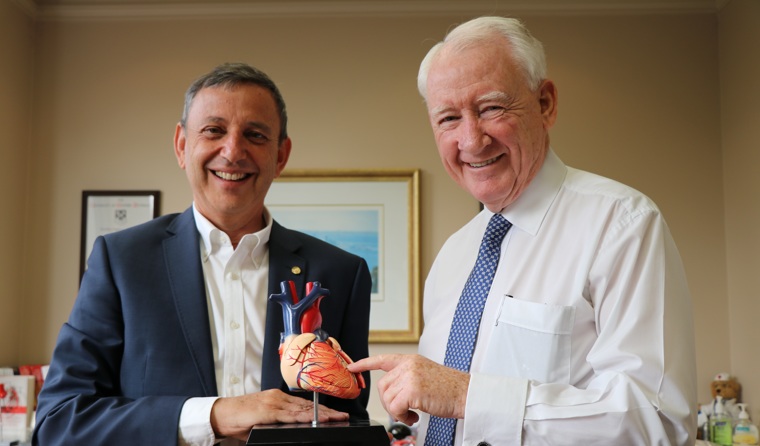News
‘Important’ study shows gout medication can halt coronary disease progression
The major clinical trial found use of low dose colchicine reduces heart attacks and the need for coronary stenting or bypass surgery by 30%.
 Coronary heart disease is the leading cause of death in Australia.
Coronary heart disease is the leading cause of death in Australia.
The international study, published in The New England Journal of Medicine, examined the effect of low dose colchicine in patients with chronic coronary disease who were already taking established treatments.
The two-year randomised, controlled, double-blind trial, led by GenesisCare in partnership with Perth’s Harry Perkins Institute of Medical Research (HPIMR) and the Dutch Network for Cardiovascular Research, involved 5522 patients from Western Australia and the Netherlands; 2762 were assigned to the colchicine group and 2760 to the placebo group.
Those in the colchicine group received 0.5 mg of colchicine once daily.
Co-leader of the study Professor Peter Thompson, a cardiologist and Deputy Director at HPIMR, said those given colchicine were found to have a lower risk of heart attack and reduced need for stents or bypass surgery due to progressive angina.
‘We found the benefits of colchicine therapy were seen soon after starting on the drug and continued to build over time,’ he said.
‘Over the course of the trial, colchicine was found to reduce the risk of cardiovascular death, heart attack and stroke by almost one third.’
Patients were required to have been in a clinically stable condition for at least six months before enrollment, and were not eligible if they had moderate-to-severe renal impairment, severe heart failure, severe valvular heart disease, or known side effects from colchicine.
Among the participants, the primary composite end-point event of cardiovascular death, spontaneous (nonprocedural) myocardial infarction, ischemic stroke, or ischemia-driven coronary revascularisation occurred in 187 patients (6.8%) in the colchicine group, and in 264 patients (9.6%) in the placebo group.
Meanwhile, a key secondary composite end-point event of cardiovascular death – spontaneous myocardial infarction or ischemic stroke – occurred in 115 patients (4.2%) in the colchicine group and in 157 patients (5.7%) in the placebo group.
No danger signals were found to be associated with long-term use of the drug.
Professor Mark Harris, a GP and Professor of General Practice at the University of New South Wales with a special interest in chronic disease, told newsGP the study was both ‘important’ and ‘reassuring’.
‘It was large enough to have cardiovascular death as an endpoint showing an absolute reduction of 2.8% in these deaths,’ he said. ‘[And] confirms and adds to previous evidence that colchicine reduces cardiovascular disease events in patients with both acute and chronic coronary syndromes.
‘Colchicine has toxicity, especially in the elderly, so it is reassuring that there were few excess adverse events; myalgia was the most common, but only one patient suffered reversable rhabdomyolysis.’
Co-leader of the study, cardiologist Dr Mark Nidorf was the first to demonstrate that low dose colchicine might be beneficial in patients with coronary disease in a small trial of 500 patients in 2013.
He said the anti-inflammatory properties of the drug, commonly used to treat gout, is what makes it so effective.
‘It’s now understood that when cholesterol gets into the arterial wall it can spontaneously form into crystals, which like gout crystals, can incite a low-grade inflammatory response that causes chronic scarring of the artery,’ Dr Nidorf said.
‘When this inflammatory process is more acute it can lead to the breakdown of plaques which can lead to heart attack and stroke.
‘What we’ve been unable to do until now is reduce the inflammatory process that goes on inside the arterial wall.’

Study co-leaders Dr Mark Nidorf and Professor Peter Thompson.
Coronary heart disease is the leading cause of death in Australia, representing one in five of all deaths.
Dr Nidorf said the trial’s findings are ‘a groundbreaking, practice changing result’, given that colchicine is widely available and inexpensive.
‘This medication does not come with the added cost of bleeding or lowering blood pressure so it is a nice fit with current treatments and will likely form a cornerstone treatment in patients with coronary disease, alongside aspirin and statins,’ he said.
The authors of the study note among the limitations of the trial was that the percentage of women involved was lower than would be expected, given the percentage of women with chronic coronary disease in the general population.
While colchicine is not yet licensed by the Therapeutic Goods Administration for use in coronary heart disease, Professor Mark Nelson, a GP and principal investigator on the ASPREE study, says it is likely only a matter of time.
‘Colchicine is likely to become standard therapy for secondary prevention,’ he told newsGP. ‘This will be so when guideline authors look at all the evidence.’
Professor Harris agrees.
‘It will certainly contribute to increased survival, so in that sense, yes [it will be life changing],’ he said.
‘However we need to see cost effectiveness studies – which are likely to be good given the survival and low cost of colchicine – and the impacts on quality of life.’
Log in below to join the conversation.
cardiovascular disease chronic disease colchicine coronary disease gout heart disease stroke
newsGP weekly poll
Which of the following areas are you more likely to discuss during a routine consultation?